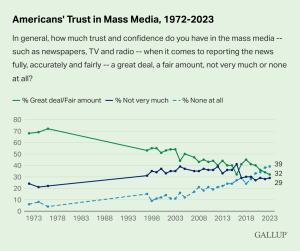
The recent Gallup poll confirmed what we all feel: Americans do not trust the media. A shocking 39% percent declared a complete lack of trust. Another 29% said they do not trust the media very much. In other words, an alarming majority of 68% do not trust what they read in publications, see on TV, or hear on their radios. Only 32% of Americans declared some trust in the media.

By looking at the Gallup chart, we can see that it is slightly worse than a year ago. But it is much worse than 20 years ago when 54% of Americans trusted their media, and only 11% did not trust the media at all. Today’s distrust is the reverse of what we had in the 1970s when almost 70% of Americans trusted the media, and only a tiny minority proclaimed a complete lack of trust.
Americans worry that they are systematically misinformed, but judging by what we can read, hear, and see, the media do not care. They are doing fine. CEOs are not losing their jobs because of that. Pundits and social media influencers make a decent income, reporting that most Americans struggle financially. In the pre-election debates, no presidential candidate offers any clear vision of how to get out of our ongoing political impasse.
What happened?
The concentration of media ownership eliminated most local papers and consolidated the ownership of many radio and TV stations. In previous decades, with the variety of sources, more ideas circulated in the public sphere. Until 1987, the Fairness Doctrine forced broadcasters to provide politically balanced reporting. With that gone, the media polarized.
Lamenting those changes is pointless. With technological progress, Walmart and McDonald’s replaced Ma and Pa stores. The same rules of the economy of scale reshaped the media.
The simplest way to make money in the media is by finding a broad audience receptive to a specific narrative. Putting a famous showperson or a pundit in front of a nationwide audience is easier than ever and more cost-effective.
Indoctrinated by their favorite guru, most Americans do not like to hear from others that they are wrong. The easiest way to make money is not by educating the public but by pleasing the audience — the bottom line benefits when the truth suffers.
Whatever the news is, CNN, more often than others, concludes that climate change and our insufficient response to it are the underlying causes of the reported problem. At Fox News, whatever they might talk about, illegal immigration is the root of the problem. They say what their audiences want to hear. A poll by another organization shows that Americans trust the BBC much more than any of their national media.
I noticed that when checking news, I usually cannot stand more than a few minutes of CNN or Fox News; then, I switch to BBC. When on BBC, I can see ads luring me back to CNN, as well as to the younger siblings of Fox News, the right-wing Newsmax, and NewsNation. If leaders of CNN, Newsmax, or NewsNation did their homework, they would know that I prefer BBC because reporters there at least try to be impartial.
Dysfunctional media make the rich richer and the poor poorer
Information is money. It sounds trivial. But money is not a trivial thing.
Democracy gives the masses power to shape the future. But it does not provide them the wisdom to make those decisions. To understand politics, one must know the economy and international finances well. Then comes the knowledge of human behavior. Only with that background can one make some sense of current events and ask the right questions to uncover facts and motives that the players try to hide from the public view.
Only a microscopic fraction of the general population has the knowledge to consume media on that level. No major media company could survive serving this audience. But that tiny minority can be that voice of reason, challenging the truthfulness of the media and, by that, making it credible.
The last time I saw it working in the American media was in the 1990s, on television shows like Firing Line and Crossfire. By hearing arguments and ripostes in the authentic debate of well-informed people, viewers did not need to be well-educated to figure out who was closer to the truth. Americans were better informed and trusted the media more.
I might be more sensitive than others to the lack of authentic political debates in the United States because my formative journalistic experience was when working at a periodical obsessively devoted to engaging its readers in the conversation, not lecturing them. It was in the 1970s in my native Poland. During my recent visits to Poland, I noticed that Polish television offered honest, down-to-the-bone political debates. They did not lecture but allowed politicians from the ruling party to show their arrogance and incompetence. It helped Donald Tusk win the election, leading to the government change last December. Americans have not seen a similar sincerity in political debates since Crossfire in the 1990s.
According to the study by Ian Anson, “Americans think they know a lot about politics – and it’s bad for democracy that they’re so often wrong in their confidence.” To get a big audience, a media operator must please the majority, reinforcing the falsehoods.
A few days ago, I saw a panel debating climate change on CNN. They all agreed and criticized some undefined opponents in general terms. In the closing, the moderator had an appeal in the tone of a zealous preacher. He referred to the evidence reaching back decades, proving that climate change is real.
I looked outside the window. I did not see the glacier that was there 12,000 years ago. Global warming started then and is still going, sometimes slower, at other times faster. I want the CNN lecturers (they are not reporters; they are lecturers) to tell me why the government needs to take my taxpayer’s money to help American businesses modernize to accommodate climate change. They have much more money than I do. But no one ever would hear anyone asking those kinds of questions on CNN. Hence, Americans see CNN as not trustworthy.
On Fox News, lecturers (they are not journalists either) were talking about billions of dollars the U.S. government spends on illegal immigrants. I have not seen reports showing the government giving cash to foreigners trespassing the border. So, I would like to ask the propagandists at Fox News who is getting that money. We know that it goes to businesses handling those illegal immigrants. Also, a lot of money goes to companies building the wall. Border guards need a lot of hardware. Some American businesses sell all that stuff to the government.
It means that those hundreds of billions that Fox News complained about are a business boom for some American corporations. Can Fox News tell us who they are? What are their lobbying goals?
Also, the budget for immigration and border control is larger than that of the CIA and FBI combined. There are a lot of well-paid union jobs. What are their lobbying objectives? Are those people receiving hundreds of billions of dollars from the U.S. government interested in rational immigration policy so they would lose their lucrative business and good union jobs? No one could hear those kinds of questions on Fox News. No wonder Americans consider it untrustworthy, too.
Some time ago, I looked at Medicare Advantage plans. Ads promoting them are on both CNN and Fox News. But a closer analysis shows that those plans might benefit a few, but for most, they are a financial trap; they rob seniors of their life savings. Again, none of the major media outlets will discuss this subject.
The case of Medicare Advantage clearly shows what one could conclude from the two previous examples: Americans do not trust the media because big money controls what we read, hear, and see. The official line is that freedom of expression allows a media outlet to express the political preferences of its owners and operators. But by looking deeper, one can see that behind the various political agendas of media outlets are the same business interests. This viewpoint does not have the same freedom of speech as others.
The great divide in the nation is not between falsehoods and the truth. It is between different business interests seeking popular support to get more from the public coffers. The game for getting our taxpayers’ money has its losers and winners. Regardless of which wealthy people get more from the government, American taxpayers are always the losers. They are the ones who pay.
None of the American media companies is structured to make money by searching for the truth. None of the mainstream media outlets will talk about it because the concept of truth in the American media is false.

 Many tell us what to think. I ask my readers to be skeptical. Question me and others.
Many tell us what to think. I ask my readers to be skeptical. Question me and others. 
